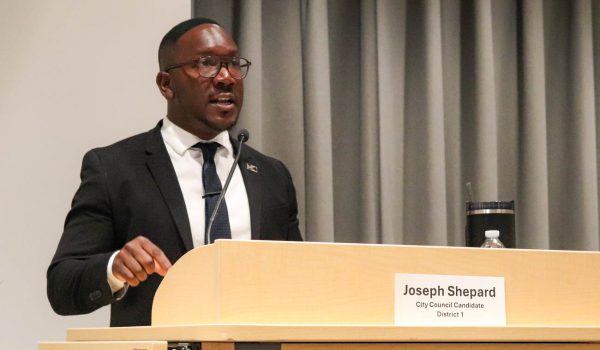Having troubles with a professor? Here’s what to do
Julia Nightengale / The Sunflower
Brien Bolin, the Associate Dean of Student Success, discusses the steps a student should take when they have problems with a professor on Aug. 18, 2021.
Through the course of a college career, a student might find themselves being unsatisfied with a course for various reasons— whether it may be the professor or the content.
“Maybe [the professor’s] teaching style isn’t what you’re used to,” The Associate Dean of Student Success Brien Bolin said. “Maybe you don’t understand their expectations or they don’t understand your expectations, so sometimes just opening up that communication and engaging with a faculty member is the first step.”
Bolin’s first step is to reach out to the specific professor in question. By policy, professors have to keep a sufficient number of office hours for students. Students should schedule an appointment instead of trying to catch their professor on the way out of class.
If that doesn’t work, the next step would be to contact the department chair. In LAS, bachelor level coordinators have been appointed for every program as an intermediary step if the department chair feels unapproachable.
The next person to contact after would be the dean of the college, and if still not resolved the Associate Vice President for Academic Affairs.
A way that students can help make their voices heard about courses is by filling out their SPTE-R’s, which are evaluations of courses sent to student emails at the end of every semester.
“They need to be honest, but they need to be honest in a way that is productive,” Bolin said. “Because if the SPTE comes back with some concrete things that the faculty can do, we all want to improve.”
Bolin said it is also important to remember that there are many different types of faculty at WSU. There are non-tenured track faculty, as well as tenured track faculty. Tenured track faculty usually have expectations set by the university that include teaching, service, and research.
There are also lecturers who are chosen from the community because of their expertise, and GTA’s, who are students themselves.
“They are also taking classes at the same time that they are teaching classes, so they have the same struggles and anxiety around their own classes and their own learning,” Bolin said.
If a faculty member is continually having low performance, they will have several rounds of evaluation on their teaching, service, and research. Students don’t often travel down this path and oftentimes rely on informal networks— Such as Rate My Professor or word-of-mouth to choose their professors.
Bolin said it is also possible to see which classes and professors are more popular than others through enrollment numbers in courses.
While it is important to get to know your professor, it is also important for faculty to get to know their students and what their definition of success is.
“The faculty need to know who their students are too, because it’s not about everybody succeeding to the same level,” Bolin said. “It’s more subjective. I’m not saying do away with grades, but I am saying students are all successful in their own ways and learn in their own ways.”
If there’s a class that is needed but isn’t being offered, Bolin said that students can talk to their department chair. Bolin said that he has helped put together multiple different curriculum’s, degree programs, and certificates based on what they were hearing from students.
“If it weren’t for the students, we wouldn’t be here,” Bolin said. “We need to make sure we are doing what we can for the students.”
Bolin said it is important to connect and engage with your courses to avoid this issue. It’s important to read the syllabus for each of your courses and be mindful of how withdrawing from a class will affect scholarships or financial aid.
“It’s not a one way transaction, we learn from each other,” Bolin said. “If I was talking to students all the time and not listening to them, I wouldn’t grow and we kind of grow together. We’re lucky that this is what we get to do.”

Julia Nightengale was a third-year reporter for The Sunflower, previously working as a Copy Editor and News Editor. Nightengale is a graduate student working...














Lydia • Aug 18, 2021 at 6:54 pm
These process in line still don’t work. Abusive professors are allowed to remain in positions of power and continue treat students horribly, regardless of years of accusations and proof. Title nine doesn’t protect students it protects the university and their tenures professors.
I’m not criticizing the writer but the systems and policies that universities have in place and how they do not communicate or display the value they should for their students.
Why is this article not from a students point of view? Why are we not talking about the real issues here? WSU didn’t even have a proper procedure for grad students to report which communicates a lack of care.